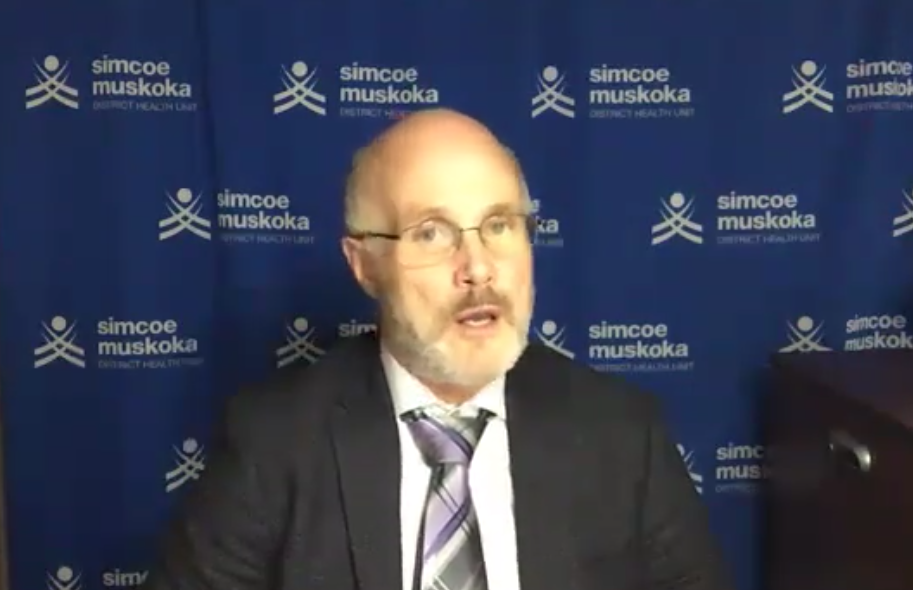The region’s medical officer of health was recently asked when people can get back to normal, but the question prompted reflection on the global nature of the pandemic.
Since March 2020, and earlier in some parts of the world, the COVID-19 pandemic has brought unprecedented levels of restrictions beyond (at least in duration) even what was in place during the Spanish Flu pandemic of 1918.
Though some politicians initially suggested a couple of weeks of staying home would flatten the infection curve, it’s now going on two years of public health measures like wearing masks indoors, physical distancing, and working from home where possible.
“If this is something we’re going to have to live with, when can we start living?” read a comment posted to the Simcoe Muskoka District Health Unit's social media pages.
Dr. Charles Gardner, medical officer of health for the region, read the question aloud during his most recent weekly media briefing.
“I sympathize with the desire to go back to the lives that we had before this pandemic,” said Gardner. “Unfortunately pandemics can go on a long time, and this is the pandemic of the century … and by all accounts when we look at the transmission pattern around the world, it doesn’t appear to be slowing.”
The doctor said he couldn’t answer the question of when life would return to “normal.”
“We are still faced with this tremendous task before us … I do not know when and in what way we could get back to a more normal existence,” said Gardner. “Getting vaccinated is the single most important thing you do, but otherwise stick with the masking and the distancing when you’re in those public spaces, and being careful at work.”
The COVID-19 vaccines are statistically effective, with tests showing they do prevent infection (though not 100 per cent of infections) and prevent severe illness.
Public Health Ontario reported evidence shows the current COVID-19 vaccines in use in Ontario reduce infection by up to 90 per cent, and can reduce transmission to other individuals. However, vaccinated people can get COVID, and can transmit COVID to others.
Though some politicians and even public health experts have proclaimed the vaccines as the way out of the pandemic, even with vaccination rates nearing 80 per cent of the population of not only the region, but the province, and even Canada-wide, there are still restrictions in place.
Restrictions that have been lifting and descending again as the wave of cases ebbs and flows. The federal government has closed Canada’s borders to travellers from 10 African countries after the recent discovery of a new COVID variant dubbed omicron, the 15th letter of the Greek alphabet.
Though there’s still a lot of research going into the omicron variant to determine the risk it poses, it’s a reminder, according to multiple public health experts, that vaccination against a global pandemic must also be a global effort.
Dr. Angelique Coetzee is credited as one of the first doctors to detect the omicron variant in South Africa. She said in an interview with CBC News, the cases she’s seen have been in young people who were treated at home with no severe symptoms. But COVID-19 is more than its latest variant.
“No one will sleep safely at night, not before Africa has been vaccinated,” she told the CBC.
Ourworldindata.org reports 54.9 per cent of the world’s population has received at least one dose of a COVID-19 vaccine, but most of those are in wealthy countries.
Other than Tunisia (43.5 per cent) and Morocco (61 per cent), there are no countries in Africa with more than 25 per cent of the population vaccinated. In fact, many of the country’s report less than 10 per cent of their populations are vaccinated.
“The world as a whole is not getting this under control,” said Gardner. “Undoubtedly we will need to rally internationally to provide vaccination to the entire world to help bring this under control and even then we’re going to have to be cautious with the other measures … because it’s just so transmissible.”
There are approximately 1.2 billion people living in Africa, and about 100 million people have been fully vaccinated against COVID-19 with another 50 million having received one dose.
Canada has contributed both funds and vaccines to COVAX, an initiative that pools resources from 190 economies to provide vaccines to low- and middle-income countries.
The federal government has pledged to donate 200 million vaccines (in actual doses and in funds to buy doses) to COVAX by the end of 2022.
UNICEF also accepts donations from the public for a Give a Vax fund which covers the cost of transporting vaccines, keeping them at the right temperature during the journey, and training health care workers to administer the vaccines.
“I don’t doubt the importance of the international effort, and while we have a large number of cases around the world, the potential will persist for new variants of concern developing,” said Gardner.
